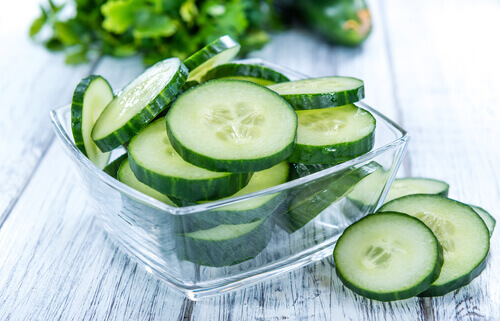6 Natural Remedies for Eye Inflammation


Reviewed and approved by the doctor Maricela Jiménez López
Do you have a tired look and inflamed eyes? Eye inflammation is the result of a series of factors. After all, the technological era has made us strain our eyes. We do this with several devices like cell phones and computers. Luckily, all isn’t lost. There are several remedies that counteract this problem.
We want to give you some home remedies that will help you to refresh your vision, reduce tiredness, and help manage liquid retention.
3 common effects of eye inflammation
- An opaque look. Even though you don’t believe it, your gaze may look dull because of tiredness. This will make you look physically sad. A person with a naturally light expression isn’t the same with a dull look in their eyes.
- Dark circles. Dark circles under your eyes can be hereditary. In most cases, however, they’re a result of bad habits and a lack of sleep.
- Under eye bags. They’re one of women’s worst enemies. They’re one of the worst enemies of any kind of makeup. They can make your eye inflammation more noticeable.
You should also read: Discover How Diabetes Affects Eyesight
Remedies for eye swelling
According to popular beliefs, you can use certain natural remedies to reduce eye inflammation and, thus, have a much fresher and more rested appearance.
1. Cucumber

This vegetable is believed to help fight eye strain, puffy eyes, and dark circles. Try to apply this remedy every day before you go to bed. This way, your eyes will relax even more during the night.
Ingredients
- 1/2 a cucumber
Instructions
- Cut a few cucumber slices and put them in a dish. Place this dish in a refrigerator to cool for a few hours.
- After that time, place a slice on each eye and try to relax for 15 minutes.
- Take off the cucumber and rinse with lukewarm or cold water.
2. Olive oil
According to beliefs, olive oil has antioxidant properties to help keep you healthy and, in a certain way, prevent eye inflammation.
Ingredients
- 5 drops of olive oil
Instructions
- Gently rub the olive oil on your eyelids and under your eyes.
- Let it work for 10 minutes and rinse it off with warm water. Be careful that the oil doesn’t get into your eyes.
- Finally, put a small cold green tea bag under each eye. This fights acute ocular inflammation.
3. Cold chamomile

Chamomile has been used for vision problems for as long as anyone can remember. It has a refreshing effect and reduces inflammation without hurting your skin.
We recommend that you use chamomile tea bags instead of loose flower buds. This keeps them from falling into your eyes.
Ingredients
- 2 chamomile tea bags
- 1 cup of hot water (250 ml)
Instructions
- Make tea like you normally do to soak the tea bags.
- Put the teabags in the refrigerator for two hours.
- Put one tea bag on each of your eyes. Leave them there for 15 minutes.
- Finally, rinse your eyes with cool water.
4. Cilantro tea
People have attributed anti-inflammatory properties to cilantro. Therefore, it can be a good remedy against eye inflammation.
Because it’s an herb, it’s very important that you make and apply this tea carefully when treating eye inflammation. It’s important that you give yourself time to wash the cilantro. This gets rid of any dust or fumigation residue left on the cilantro.
Ingredients
- 3 stalks of cilantro, washed
- ½ cup of water (100 ml).
Instructions
- Boil the cilantro stalks until the water starts to turn green.
- Take it off of the heat and let it rest.
- When the tea is at room temperature, soak a cotton pad with the tea. Then, place the soaked pad on your eyelids.
- Keep your eyes closed until the tea has been completely absorbed.
- Remove the cotton pad and wash your face well to keep any residue from getting into your eyes.
- Then, apply a hydrating cream around your eyes.
5. Linseed oil and carrot mask

Linseed gives your skin nutrients to the sensitive skin around your eyes. It does this thanks to its omega-3 content. According to beliefs, linseed oil is a product that indirectly helps maintain good eyesight health and prevent these types of diseases.
How? For example, by regulating cholesterol levels in the body, a function that reduces the risk of suffering from obesity and which, at the same time, manifest through vision alterations.
For its part, carrots are used to relieve eye irritation or fluid retention that forms unpleasant bags.
Ingredients
- ½ tablespoon of linseed oil (7 g).
- 1 small grated carrot
Instructions
- Mix the two ingredients and apply the mask to the skin around your eyes.
- Let it work for 10 minutes. Then, rinse it off with warm water.
6. Grape seeds
These seeds are a rich source of antioxidants, vitamin C, and natural oils. You can get them in health food stores or you can get them directly from fresh grapes of your choice.
Ingredients
- 1 tablespoon of grape seeds (10 g).
- 1 tablespoon of avocado oil (5 g).
Instructions
- Crush the grape seeds and mix the powder with the avocado oil.
- Apply this mixture to the skin around your eyes. Let it work for 20 minutes.
- Then, rinse it off with cool water.
Final note
Although there’s no scientific evidence that these remedies are effective for eye inflammation, some people believe that incorporating them into their routine will improve their health, prevent vision problems, and make them look more rested.
All cited sources were thoroughly reviewed by our team to ensure their quality, reliability, currency, and validity. The bibliography of this article was considered reliable and of academic or scientific accuracy.
- Srivastava JK, et al. (2010). Chamomile: A herbal medicine of the past with bright future [Abstract]. DOI:
doi.org/10.3892/mmr.2010.377 - Mukherjee PK. (2013). Phytochemical and therapeutic potential of cucumber. DOI:
10.1016/j.fitote.2012.10.003 - Nema NK, et al. (2011). Cucumis sativus fruit-potential antioxidant, anti-hyaluronidase, and anti-elastase agent. DOI:
10.1007/s00403-010-1103-y
This text is provided for informational purposes only and does not replace consultation with a professional. If in doubt, consult your specialist.








